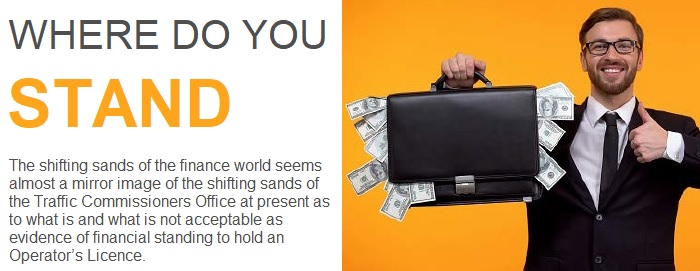Scott Bell from Backhouse Jones explains what can and cannot be taken into account when calculating financial standing for a UK Operator’s licence.

There also seems to be a difference between what the Traffic Commissioner will accept as evidence for an application for a licence and what is acceptable as evidence in order to continue holding that licence. To hold an Operator’s licence the holder must be able to demonstrate sufficient financial standing. The obligation is a continuing one and if the operator feels that for whatever reason they do not continue to hold financial standing, they must inform the Traffic Commissioner.
How much is required
The current financial standing rates were set from 1 January, 2019 and are:
• £8,000 for the first vehicle and £4,450 for each additional vehicle for applicants for, and holders of, standard national/international Operator’s licences;
• £3,100 for the first vehicle and £1,700 for each additional vehicle for applicants for, and holders of, restricted operator licences.
The Traffic Commissioner has confirmed that these levels will remain unchanged for 2020.
When is it necessary to demonstrate financial standing?
An applicant for, or holder of, an Operator’s licence must be able to demonstrate, to the satisfaction of the Traffic Commissioners, that they are of the appropriate financial standing
upon application for a new Operator’s licence or a variation to an existing Operator’s licence, upon being called to appear at Public Inquiry, at the five-yearly review stage of the Operator’s licence and on a continuous basis.
Why is it necessary?
The logic behind the requirement to be of the appropriate financial standing is to ensure that the operator has sufficient financial resources available to maintain its vehicles in a
fit and roadworthy condition (thereby safeguarding road safety) and compete fairly with other operators.
What does financial standing actually mean and how can applicants and operators satisfy the requirements? The key test is whether the applicant for, or holder of, the Operator’s licence can demonstrate that it has ‘available’ capital and reserves equal to the required sum. ‘Available’ is defined as “capable of being used, at one’s disposal, within one’s reach, obtainable or easy to get”. The Traffic Commissioner will therefore consider how much money the applicant or operator can access, how quickly and where from.
Evidence to be taken into account
Concentrating on existing Operator’s licences, typically the evidence the Traffic Commissioner can take into account is set out in the Senior Traffic Commissioner Statutory Guidance No2 available on the gov.uk website. As a general rule of thumb, the evidence of financial standing must be in the operator’s name and not held by any 3rd party.
Primarily, operators are entitled to rely on their annual accounts provided that they are certified by a properly accredited person and those accounts show capital and reserves
over the financial standing figure. Usually certification of those accounts is provided by an auditor and such certification is generally mandatory for companies with a turnover exceeding £10.2m but an operator can choose to have their accounts certified if they
wish.
More recently, we have seen a move from the Traffic Commissioners to not accept the submission of certified annual accounts and that they still want to check the cash reserves. Whilst we do not agree with this approach from the Traffic Commissioner as we do not
believe that the Traffic Commissioner has such a discretion in these scenarios, operators need to be aware that this may be the approach that the Traffic Commissioner takes with them.
If the operator does not submit certified annual accounts, the UK has exercised its right under the EC 1071/2009 to allow derogations for additional evidence of financial
standing to be accepted.
We suspect that all operators are aware that cash in the bank, available overdrafts and unused availability on invoice factoring facilities can be used as evidence of financial standing, providing that these accounts are in the company name. The Traffic Commissioner will check these accounts over the last three months and take an average availability to ensure that financial standing is shown.
However, other traditional routes to showing financial standing seem to be fading from acceptability by the Traffic Commissioners.
Historically, a number of operators would seek to show financial standing by way of the availability of a working capital loan facility. These appear in the Statutory Documents
to be an acceptable method of showing financial standing but over the previous 12 months, the Traffic Commissioners at Public Inquiry have required operators to draw down those funds from the loan facility to show that they are ‘truly available’. This has been met with often quizzical looks from the operators as to why they would need to draw down such
figures simply to show the Traffic Commissioners it can be done.
Another method of showing financial standing was unused credit cards in the operators name. Now however, if most of the financial standing is being demonstrated by reference to credit card availability, the Traffic Commissioners tend to refuse to accept this as evidence. This is done on the basis that credit card APRs are often high and an expensive form of borrowing and therefore the Traffic Commissioners can question as to whether such funds are truly available as they are likely not to be used.
We have seen a similar story with Operator’s licences held by sole traders or partnerships in which personal funds held in ISAs/Building Society accounts were previously acceptable
but are now not so reliable sources. Finally, we have seen a departure from Traffic Commissioners to allow a 3rd party to give a statutory declaration for money being available for existing operators.
What to do
Essentially, if you are reading this article and thinking how are we going to demonstrate financial standing if asked, it is worth looking at the sources of finance that you have available and ask how reliable that source will be in light of the above.
As before, there is an obligation on an operator to inform the Traffic Commissioner if they fail to meet financial standing and, if so, request a period of grace to continue operating
whilst matters are resolved. When requesting the period of grace, you will need to identify the measures that you are taking to ensure that financial standing will be met in the future.
For more information contact scott.bell@backhouses.co.uk.
 Scott Bell
Scott Bell
Scott Bell is a senior solicitor at Backhouse Jones. He qualified in 2010 and he specialises in Road transport law covering goods and passenger carriage. Scott has extensive experience in Public Inquiries involving all matters. Scott provides advice to assist clients with compliance within the regulatory framework of Operator’s licensing including advice regarding business structure.
Photo: Scott Bell, Backhouse Jones